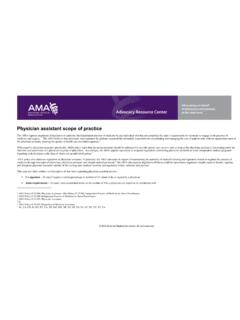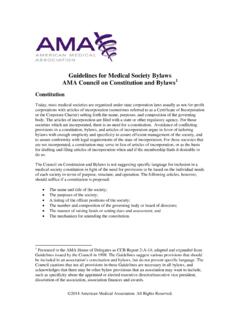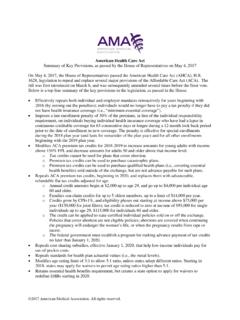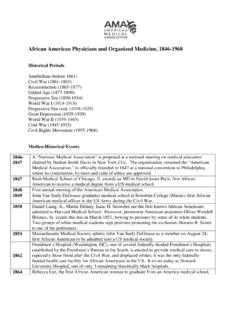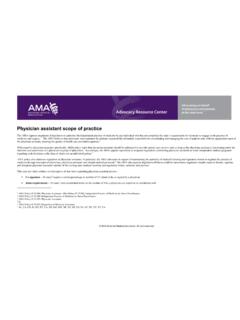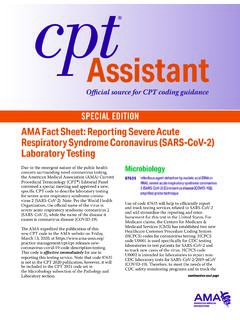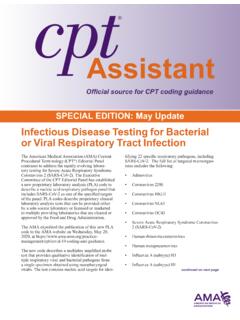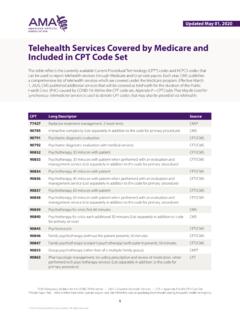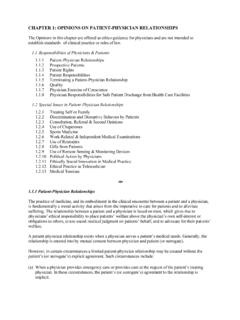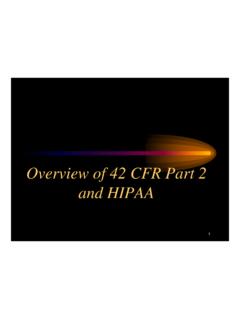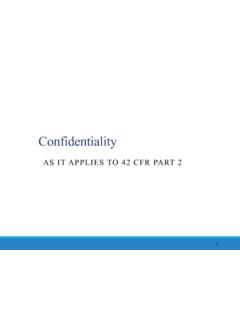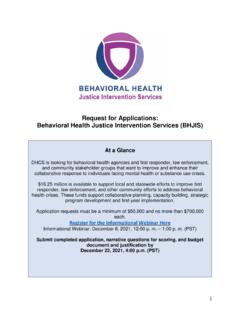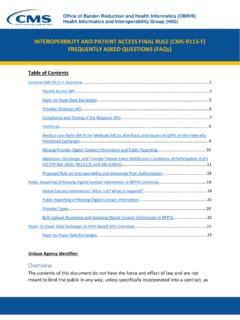Transcription of PATIENT ACCESS CHALLENGES Obtaining Medical Records …
1 2021 American Medical Association. All rights reserved. 1 Scenario 1: My primary care doctor and cardiologist need more information on the chemotherapy regimen that was used to treat my cancer ten years ago. I called the oncologist s number, and it was disconnected. I checked online and it seems his office closed years ago. Why didn t anyone let me know? How do I get a copy of my Records now? Scenario 2: I stopped by my doctor s old office. It was no longer a doctor s office. The receptionist had no information for me. I desperately searched for the other physicians that also used to be in the practice to no avail.
2 I called the Department of Health. I searched for my doctor on the internet, Facebook, and LinkedIn hoping I could find him and ask how I could get a copy of my Medical Records . What if I never get in touch with him? I need copies of my Medical Records to include in my social security disability application. Without them, I m afraid my application will be denied. Scenario 3: My doctor passed away. She was in a solo practice and didn t use electronic Medical Records . It was all paper charts. I didn t know where to go to get a copy. I was able to find some contact information for her surviving family members online hoping they could help me.
3 I felt so guilty bothering someone who is grieving the loss of their loved one so I could get ACCESS to my Medical Records . It shouldn t be this complicated. Barriers to ACCESS Overview: Obtaining Medical Records from Practices that are ClosedPhysician practices close for several reasons. Physicians may merge with another practice or hospital system. They may sell or close their practice for financial reasons, such as in the event of the negative financial consequences incurred because of the COVID-19 pandemic. Physicians may retire. They may get sick and pass away.
4 In short, while there are numerous reasons that a practice may close, patients and their families may encounter significant barriers to Obtaining Medical Records if a physician s practice closes and there isn t a robust plan in place to provide patients easy ACCESS to their the Practice is Permanently Closed The Health Insurance Portability and Accountability Act (HIPAA) gives patients the right to ACCESS and get copies of their Medical Records . Unfortunately, many patients struggle to exercise this right when their physician s practice has closed. This is most concerning in settings that for whatever reason do not use electronic health Records (EHRs), such as in behavioral health practices, many independent practices, and some practices and clinics in rural settings.
5 This is because patients may live far from the location where they received care or simply have one less method available to them to ACCESS information absent ACCESS to an online PATIENT portal or smartphone app facilitating ACCESS to an record retention requirements, in general, are not specified by HIPAA, but rather state laws. The American Health Information Management Association (AHIMA) provides a guidance on Protecting PATIENT Information after a Facility Closure and a resource on state laws governing Medical Records retention after the closure of a practice or facility.
6 Relevant agreements, such as physician employment and services contracts, Obtaining Medical Records from Closed Practices PATIENT ACCESS CHALLENGES 2021 American Medical Association. All rights reserved. 2could also govern record availability upon practice closing. State statutes of limitations, and/or hospital policies and procedures, can also impact record retention and availability. Physicians should contact the Medical Board of the state in which they practice as part of their practice closure strategy. If a physician decides to store Medical Records with a custodian, patients still have a right to request ACCESS to a copy as per HIPAA, so long as the Records are available as per state laws and other agency and organizational regulations for retention.
7 AHIMA also has a resource with more information on Retention and Destruction of Health Information that may be useful for physicians to review. While HIPAA protects a PATIENT s right to privacy and Medical information for up to 50 years after the PATIENT s death, state laws on the duration of time that clinicians must retain Medical Records vary from state to state. One of the most common ACCESS CHALLENGES patients face is failure to realize that their physician s practice is closing or has closed. Physician practices should make every effort to inform patients of a practice closure or when a physician ceases to practice medicine with ample time for the PATIENT to obtain a copy of their Medical Continuity of Care & Medical Records CoordinationPlans for closing, selling, or retiring from practice and what to do with Medical Records should begin at practice start-up.
8 The American Academy of Family Physicians (AAFP) has a resource for physicians starting, selling, and closing a practice. Its Closing Your Practice Checklist highlights the importance of having a proactive plan for Medical Records retention. Physicians must plan for safe, HIPAA-compliant storage of both paper and electronic Medical Records , as well as imaging and pathology samples, tissue blocks, and slides, if their office should close. State Medical Boards must be notified of anticipated closures. Physicians must confirm how long Records need to be stored as per state and other applicable laws and should be notified by a letter at least 60 days (or greater when required by applicable law) in advance of an upcoming office closure, where possible.
9 The letter should specify the date of the anticipated closure, the option to transfer Records to another physician, the option to obtain a personal copy, and the contact information of the appointed custodian overseeing Medical Records storage. The AMA also recommends that all physicians who plan to close their practice provide their local post office with a forwarding address in case a PATIENT needs to contact them in the future. Closing practices should encourage patients to either transfer their Records to another physician s office or to pick up a copy with instructions on best practices for coordinating one s care from this juncture.
10 This can be done via written correspondence and a copy of this letter should be placed in each PATIENT s chart. Patients who are diagnosed with high-risk conditions, who are actively undergoing aggressive treatments, or who require routine follow-ups should have their letters sent with a return receipt request to minimize any disruptions in care or continuity of care. Every attempt should be made to notify the PATIENT about the office s closure or the physician s departure from Medical practice. Physicians should also consider contacting any specified emergency contacts, PATIENT advocates, personal representatives, legal guardians, or executors of the estate of the forthcoming office closure or cease of Medical practice in an attempt to coordinate Medical Records and continuity of should include an Authorization for Use and Disclosure of Health Information letter (AMA PATIENT Records Electronic ACCESS Playbook, Appendix C, p.)
